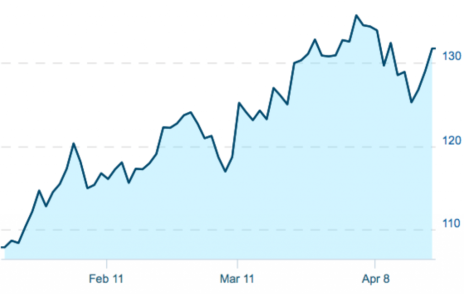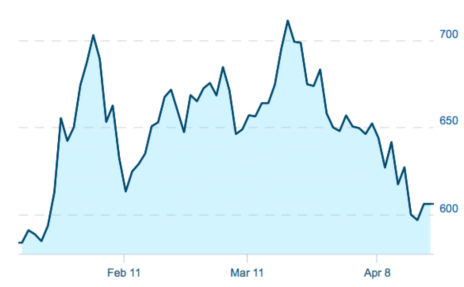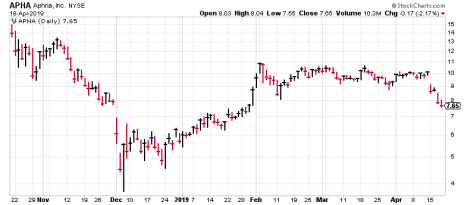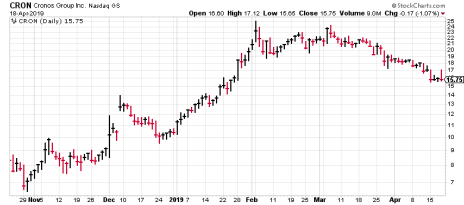Marijuana stocks have been an exceptionally profitable sector this year, with the Marijuana Index up 41% so far. But I’m starting to look for the exits, because I’m seeing increasing signs of a top.
Here are the signs.
Six Signs Marijuana Stocks Have Peaked
1. Stocks tend to peak when the news is great and bottom when the news is terrible. For example, the marijuana sector peaked last October on the very day that marijuana commerce became legal in Canada—and after that it fell 42%!
Marijuana is not yet legal in the U.S., so we don’t have the equivalent good news yet, but there have been some very favorable developments in this country. First, the Farm Bill, passed in December, legalized hemp trade, which was great news for the CBD industry. And second, it’s now looking very likely that the banking industry in the U.S. will soon be allowed to serve the cannabis industry, thanks to a push by bipartisan politicians in Washington of the Secure And Fair Enforcement (SAFE) Banking Act.
[text_ad]
As a result of this good news, U.S. cannabis stocks have been hot this year.
U.S. Cannabis Index
While Canadian cannabis stocks have made very little progress.
Canadian Cannabis Index
2. Business is absolutely booming. Of the 14 companies in my Cabot Marijuana Investor portfolio, the average growth rate in the latest quarter, relative to the previous year, was 409%. The median, for you statistical fans, was 255%. This is one fast-growing sector! But it’s going to slow down.
3. The pace of deal-making is crazy! I don’t have statistics on this but it seems that every day, some public company is buying another company, either public or private. The biggest deal in the industry came last August, when alcohol giant Constellation Brands (STZ) increased its investment in Canopy Growth (CGC) to 38% for a whopping $4 billion.
Then, just last week Canopy announced it was completing an agreement to buy Acreage Holdings (ACRG) for $3.4 billion, once marijuana becomes legal in the United States. Acreage is a New York-based multi-state operator with some big names on its board: former House Speaker John Boehner, former Canadian Prime Minister Brian Mulroney, and former Massachusetts Governor Bill Weld—who just happens to be running for President—as well as Snoop Dogg and Martha Stewart as partners. Acreage had revenues of $10.5 million in the latest quarter, and would give Canopy a good platform in the U.S.
And the very same day, Acreage announced that its subsidiary, High Street Capital Partners, was buying Deep Roots Medical, a vertically integrated cannabis operator in Nevada, for $120 million, thus increasing Acreage’s total state footprint to 20 (including pending acquisitions) – the largest in the U.S. cannabis industry. Deep Roots currently manufactures and produces four cannabis brands: Deep Roots flower, concentrates, cartridges, disposable pens, shatter, wax, and distillate for edibles; Chillers hard candies, with flavors including watermelon, lemon, cinnamon, mango, and pineapple; Bluebirds pre-rolled products; and Helix Twist – a line of gummies that come in six flavors including Sour Cherry, Key Lime, Blood Orange, Cucumber Serrano, and Ginger Peach. Deep Roots has licenses to operate seven retail dispensaries, four of which are in the greater Las Vegas area, but could conceivably market its brands across the country and even in Canada—if Constellation thinks it’s best.
4. The unicorns are multiplying. Every day I read news about unicorns coming public. This is a term that was coined just six years ago by a venture capitalist with a flair for marketing and now people think it’s a synonym for a great investment. Those same people been waiting anxiously—according to the media—for the IPOs of Uber, Lyft, Pinterest and Airbnb. But Lyft came public at the end of March with a valuation of $20 billion, and 12 days after coming public, it had lost 31% of its peak value! Pinterest came public last Thursday with a valuation of about $13 billion and I’ll be interested to see where it sits in a week or two. In my book, IPO stands for “It’s Probably Overpriced.”
5. The charts of the old leading marijuana stocks are already rolling over. The biggest Canadian stocks are all well below their highs of earlier this year, with Cronos (CRON), which is backed by Altria (MO) and Aphria (APHA), leading the way down. Take a look.
6. Last but not least, my readers are exceptionally happy, as virtually every marijuana stock I’ve recommend for them this year has made money, with my Cabot Marijuana Investor portfolio up 51% as I write. This is a sign of an incredibly strong sector, and I know from experience that it will end at the moment of peak happiness.
So what I’m doing now is looking for the exits, so I can help my readers preserve the profits they’ve made this year, and then buy back in when the news is bad and marijuana stocks are at their lows.
To learn how to subscribe to Cabot Marijuana Investor, click here.
[author_ad]





